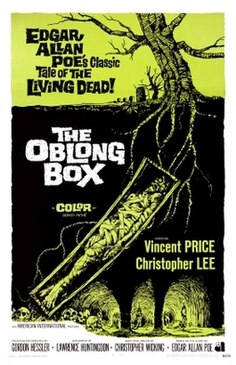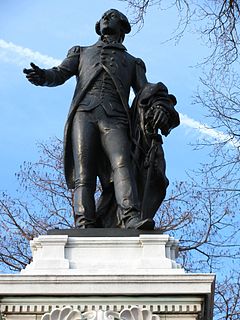
Stella Artois is a pilsner beer, first brewed in 1926 by Brouwerij Artois in Leuven, Belgium. In its original form, the beer is 5.2 per cent ABV, the country's standard for pilsners. The beer is also sold in other countries like the UK, Ireland, Canada and Australia, where it has a reduced ABV. Stella Artois is owned by Interbrew International B.V. which is a subsidiary of the world's largest brewer, Anheuser-Busch InBev SA/NV.

Hellraiser is a 1987 British supernatural horror film written and directed by Clive Barker, and produced by Christopher Figg, based on Barker's 1986 novella The Hellbound Heart. The film marked Barker's directorial debut. Its plot involves a mystical puzzle box that summons the Cenobites, a group of extra-dimensional, sadomasochistic beings who cannot differentiate between pain and pleasure. The leader of the Cenobites is portrayed by Doug Bradley, and identified in the sequels as "Pinhead".
Rosette is the French diminutive of rose. It may refer to:
A black box is a device, object, or system whose inner workings are unknown; only the "stimuli inputs" and "output reactions" are known characteristics.

The Oblong Box is a 1969 British gothic horror film directed by Gordon Hessler, starring Vincent Price, Christopher Lee and Alister Williamson. This was the first film to star both Price and Lee.

"The Oblong Box" is a short story by American writer Edgar Allan Poe, first published in 1844, about a sea voyage and a mysterious box.

Cartouche is a 1962 French adventurer film directed by Philippe de Broca and starring Jean-Paul Belmondo and Claudia Cardinale.
Ankhkheperure-Merit-Neferkheperure/Waenre/Aten Neferneferuaten was a name used to refer to a female pharaoh who reigned toward the end of the Amarna Period during the Eighteenth Dynasty. Her gender is confirmed by feminine traces occasionally found in the name and by the epithet Akhet-en-hyes, incorporated into one version of her nomen cartouche. She is distinguished from the king Smenkhkare who used the same throne name, Ankhkheperure, by the presence of epithets in both cartouches. She is suggested to have been either Meritaten or, more likely, Nefertiti. If this person is Nefertiti ruling as sole pharaoh, it has been theorized by Egyptologist and archaeologist Dr. Zahi Hawass that her reign was marked by the fall of Amarna and relocation of the capital back to the traditional city of Thebes.

A cartouche is an oval or oblong design with a slightly convex surface, typically edged with ornamental scrollwork. It is used to hold a painted or low-relief design. Since the early 16th century, the cartouche is a scrolling frame device, derived originally from Italian cartuccia. Such cartouches are characteristically stretched, pierced and scrolling.
The Oblong Box may refer to:

Christopher Wicking, also known as Chris Wicking, was a British screenwriter, often in the horror and fantasy genres, notably for the British arm of American International Pictures and with Hammer Film Productions, for whom he was the last 'resident script editor'.

Major General Marquis Gilbert de Lafayette is a statue in the southeast corner of Lafayette Square, in Washington, D.C., near the junction of Pennsylvania Avenue with Madison Place and close to the White House. The statue was erected in 1891 to honor Gilbert du Motier, Marquis de Lafayette and his contribution in the American Revolutionary War. The square, originally part of the President's Park, was named in honor of the Marquis in 1824. The statuary was made by Alexandre Falguière and Antonin Mercié, and the architect who designed the marble pedestal was Paul Pujol.

The Black Tulip is a French-Italian-Spanish film which reused some names in the novel of the same title by Alexandre Dumas but its story does not follow the novel. It is, essentially, a star vehicle for the popular French actor Alain Delon.
This page is based on this
Wikipedia article Text is available under the
CC BY-SA 4.0 license; additional terms may apply.
Images, videos and audio are available under their respective licenses.








